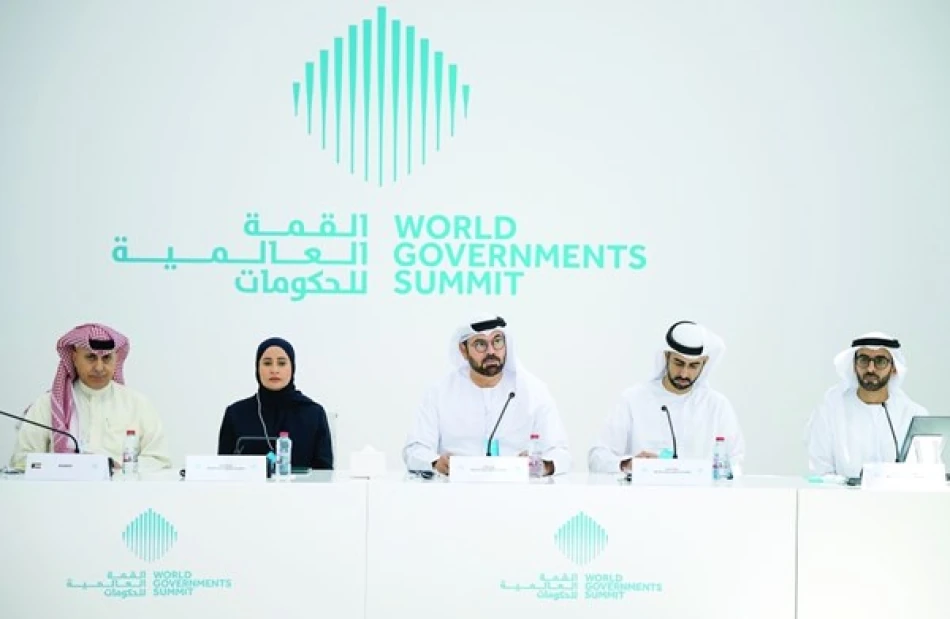
Global Governments Forum: Powering International Collaboration for the Governments of Tomorrow
UAE Positions Itself as Global Hub for Future Government Innovation
The UAE is leveraging its World Government Summit to transform diplomatic engagement and reshape international cooperation around emerging technologies. With over 100 ambassadors participating in strategic discussions on artificial intelligence governance and digital transformation, the Emirates is positioning Dubai as the premier platform for governments to navigate unprecedented technological disruption—a move that could redefine how nations collaborate in the digital age.
The Summit's Growing Global Influence
Since its launch in 2013, the World Government Summit has evolved from a regional gathering into what officials claim is the world's largest government assembly. The numbers tell a compelling story: over 100 heads of state and government have participated, alongside 3,070 speakers and 48,000 attendees. More importantly, the platform has facilitated 100 bilateral agreements and memorandums of understanding.
Mohammed Abdullah Al Gergawi, UAE Minister of Cabinet Affairs and Chairman of the World Government Summit, emphasized that humanity stands at a historic turning point requiring governments to move faster than the pace of change itself. This philosophy reflects the UAE's broader strategy of anticipatory governance—a model increasingly relevant as nations struggle to keep pace with technological advancement.
Beyond Regional Ambitions
The summit's reach now extends far beyond the Middle East. Recent initiatives include a ministerial forum with Brazil's government on digital transformation and workshops with the US Department of Commerce on AI governance. This global engagement strategy mirrors Singapore's approach to positioning itself as a neutral convening ground for international dialogue, but with a specific focus on government innovation rather than purely commercial interests.
The Reality Check: Most Governments Unprepared
A global survey of ministers launched by the summit in partnership with PwC revealed stark challenges facing governments worldwide. The findings are sobering: 74% of governments lack adequate financial resources to train their workforce for the future, 68% struggle to retain talent, and over 30 governments are deemed unprepared for future challenges.
These statistics underscore why the UAE's initiative matters beyond diplomatic prestige. As the US and China compete for technological supremacy while the EU focuses on regulation, smaller nations and developing economies need practical frameworks for digital transformation. The UAE is positioning itself to fill this gap.
Commercial Diplomacy as Strategic Tool
The summit's emphasis on "commercial diplomacy" reflects a broader shift in international relations. Dr. Thani Al Zeyoudi, UAE Minister of State for Foreign Trade, highlighted how the country's geographic position creates natural advantages for connecting global trade routes. But the real strategy goes deeper: using trade relationships to build technological partnerships and knowledge transfer agreements.
Learning from Global Models
This approach borrows from successful models elsewhere. South Korea used trade diplomacy to build its technology sector, while Israel leveraged security partnerships to develop its tech ecosystem. The UAE appears to be combining both strategies—using its trade hub status and security partnerships to position itself as a neutral ground for technological cooperation.
The AI Sovereignty Challenge
Perhaps the most significant discussion centered on "programmed sovereignty"—how nations can maintain control over their digital futures while benefiting from global AI development. Professor Sumitra Dutta from Oxford's Saïd Business School raised critical questions about what type of AI is appropriate for different societies and cultures.
This conversation arrives at a crucial moment. While the US pushes for AI leadership and China develops its own models, many countries face a stark choice: accept foreign-developed AI systems or risk falling behind. The UAE is proposing a third path: collaborative development that respects cultural specificities while maintaining technological competitiveness.
Market Implications and Future Outlook
For investors and multinational corporations, the UAE's strategy creates both opportunities and complexities. The country is essentially building a marketplace for government innovation, where best practices, technologies, and partnerships can be tested and scaled. The upcoming summit promises over 200 sessions, 15 strategic reports, and participation from 80+ international organization leaders.
The partnership with Ecuador for the second Economic and Investment Forum signals expansion into Latin America, suggesting the UAE sees opportunities beyond its traditional spheres of influence. This geographic diversification could prove valuable as global supply chains continue reshuffling and new economic alliances form.
The Competitive Landscape
The UAE faces competition from established players. The World Economic Forum remains the premier global platform for public-private dialogue, while Singapore's various summits focus on fintech and smart city development. However, the UAE's focus specifically on government transformation addresses a genuine gap in the international conference ecosystem.
Success will ultimately depend on whether the summit can move beyond discussion to implementation. With governments worldwide struggling to adapt to technological change, there's clearly demand for practical solutions. Whether the UAE can deliver them—and maintain its position as neutral convener amid increasing geopolitical tensions—will determine if this ambitious initiative achieves lasting impact or remains an impressive but ultimately limited diplomatic exercise.
Most Viewed News

 Layla Al Mansoori
Layla Al Mansoori






